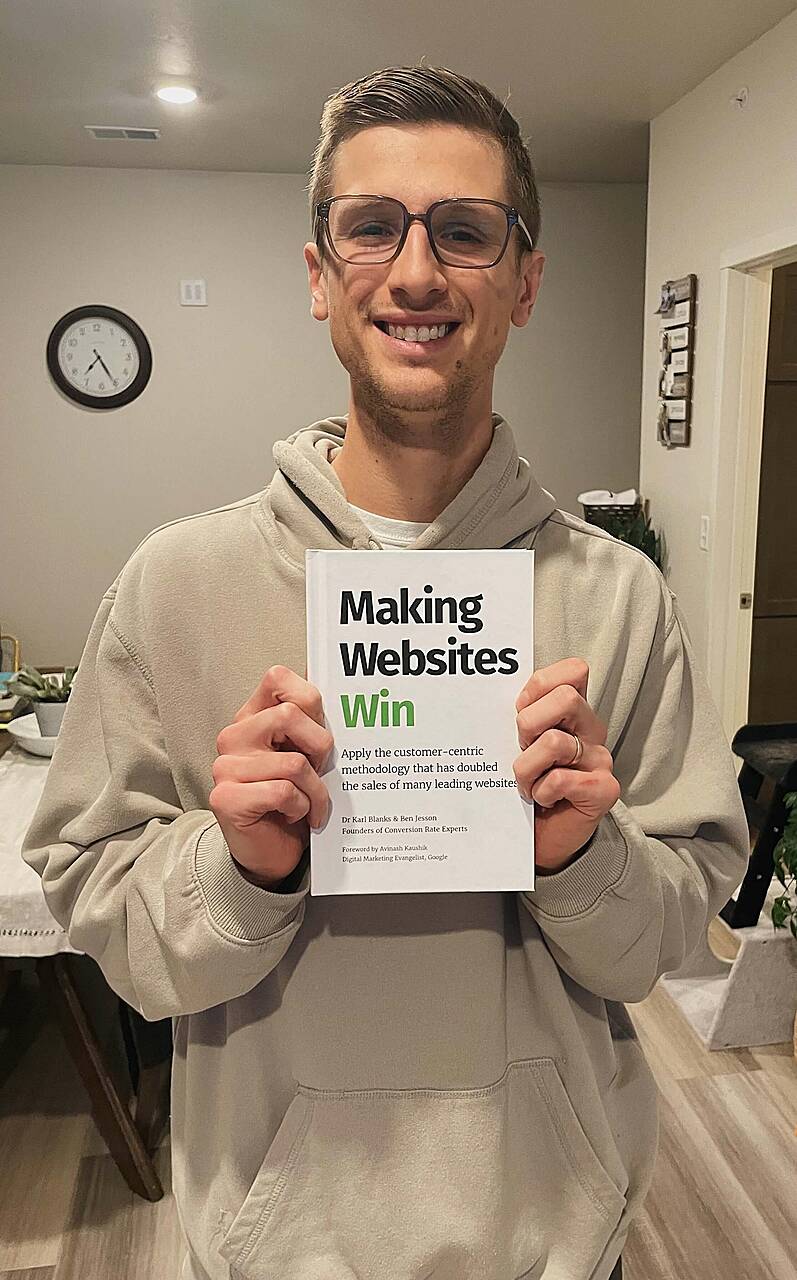It's back. Book reviews are here.
Every Wednesday (as of now), I will share an in-depth review of a recent book I've read. Last year alone (2021), I read 48 books, so I have plenty to share.
Before I share today's review, I have two requests of you:
- Share constructive feedback on how I can make this the best book review you read
- Share great books that you believe I should read (related to the book I reviewed or not)
The book: Making Websites Win by Dr. Karl Blanks and Ben Jesson
Why you should read: To improve your website's conversion through understanding Scientific Web Design
TL;DR: Making Websites Win is the field guide to improving your website and increasing conversions through DiPS (Diagnose -> Problem -> Solution) and experimentation. Rather than relying on best practices, master how to think about and improve websites through facts instead of opinions.
The main points:
Point 1: The 3 principles of Scientific Web Design
- Principle 1: The top companies design for function, not aesthetics.
- Principle 2: The top companies carry out experiments on their websites
- Principle 3: For subtle reasons, the top companies make frequent, incremental changes and rarely (if ever) have massive site redesigns
Point 2: Work-in-progress is the archenemy to improving your website
A work-in-progress is any change or update that takes too long to release, resulting in minimal real-world feedback. Therefore, colossal site redesigns are not the preferred method of Scientific Web Design.
Instead, make small and incremental changes to ship quickly and get feedback as soon as possible. For example, rather than spend a month on a new page, update the hero section in a week and observe any changes.
Point 3: Observe your website visitors to make changes that matter
Too many website decisions are made in boardrooms without the website user in mind. This results in a pretty website that's completely useless.
Instead, it would help if you took the time to understand your visitors through the following ways:
- User tests
- Watch session recordings
- Speak to salespeople
- Analyze competitors' websites
- Add your phone number to the top of every page
- Increase incentives for visitors to complete surveys
- Use surveys
One great question to ask–in surveys–after someone purchases to boost sales is, "What nearly stopped you from buying from us?"
Point 4: Length of copy doesn't matter; its architecture does.
People will read short or long copy. They will not tolerate horrible placing of copy that makes reading a drag. "No matter how long your page is, your visitors should be able to easily find the info they need." (pg. 250).
"Your challenge is one of info architecture: how can you organize all the info so that visitors see what they need at the right level of detail without getting bored? This is conversion at its hardest."
Mastering conversion is not about writing short and snappy copy. It's about structuring your copy in a way that guides your reader to the end while getting the information they need to convert. Simple as that, but one of the most difficult challenges you face as a marketer.
The main quotes:
"Most web marketers run straight to the "marketing pharmacy" and cram their web pages with every possible remedy."
"The best marketers find out–not guess–exactly why their visitors aren't currently converting."
"Low-traffic websites have two problems:
Problem 1: how can you understand your visitors?
Problem 2: how can you measure what works?"
"The best marketers are those who rapidly accept the criticism, use it to improve the page, and then user test again."
"Usability underpins all conversion."
The main question:
If you have a website or run one as a marketeer, how will you make future improvements based on data and facts rather than opinions and best practices?
⚔️
This is one of the top books I've read on website design. It will be reread and referenced when making improvements to my websites.
It also ends with a very tactical case study which makes the zillions lessons shared in the book come to life. I would highly recommend checking this book out if you touch your company's website at all.
At a minimum, it will enable you to provide better feedback and insights about website changes.
At a maximum, it will equip you with the skills needed to optimize a website for conversions, and isn't that the objective of most websites?
What's the best book you've read on website design or conversion?
🧠 + ❤️ // JO
